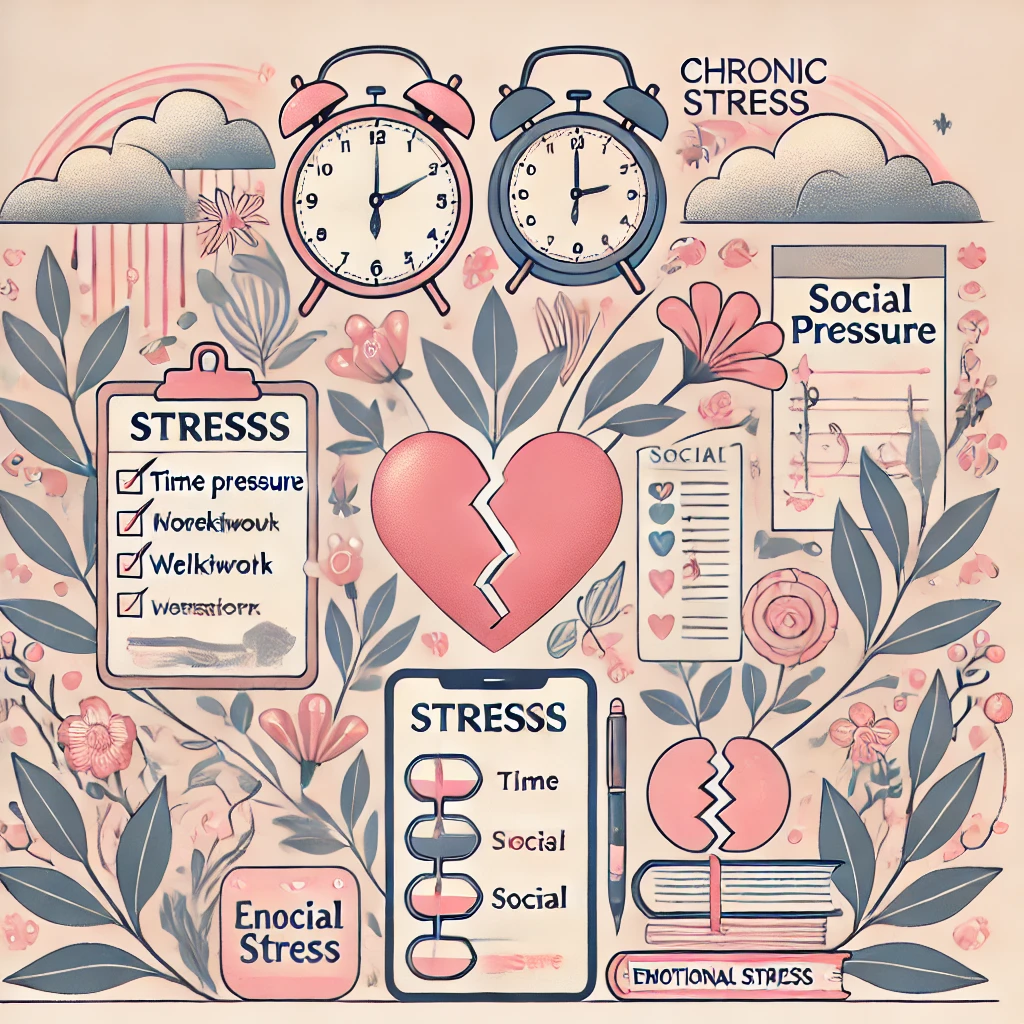Stress is a common experience that can impact your mental and physical health. This article explains what stress is, its symptoms, and how to manage it effectively.
Key Takeaways
- Stress is a complex phenomenon influenced by individual perception, genetics, and life experiences, with two main types: distress and eustress.
- Chronic stress can lead to physical symptoms such as muscle tension, headaches, and digestive issues, as well as emotional responses like irritability and anxiety.
- Effective stress management strategies include regular exercise, meditation, social support, and when necessary, seeking professional help to mitigate the adverse effects of stress.
Understanding Stress

Stress is an inevitable and complex aspect of life that all individuals face. It typically arises from unfamiliar or challenging situations which might undermine someone’s sense of stability or control, especially when in a stressful scenario. Stress varies widely among people. What may be distressing for one person could be negligible to another, rendering it difficult to quantify objectively.
Two main forms of stress exist: distress, which is the negative variant causing discomfort and potential health complications, and eustress, the positive type that can propel motivation and enhance one’s capabilities. Acknowledging this dichotomy is crucial for appreciating how stress operates differently across persons.
The way we experience stress can depend on numerous elements such as genetic makeup, formative experiences during our early years, and individual personality characteristics. While modest levels of stress can actually confer benefits by boosting motivation and efficiency, enduring chronic stress holds adverse consequences. Recognizing these subtleties enables better management strategies to convert potentially harmful distress into beneficial stress effectively.
Physical Symptoms of Stress

Our bodies respond to stress with a range of physical reactions. Persistent stress can manifest in various physical symptoms, such as muscle tension, headaches, and gastrointestinal complications. These signs serve as the body’s alert system that an issue needs to be addressed.
Chronic stress is closely associated with cardiovascular health risks. It may trigger symptoms like chest discomfort, dizziness, and overwhelming fatigue. The physiological changes during a stress response include accelerated heart rate, constricting muscles and elevated blood pressure – all part of our natural defense mechanism geared up for fight or flight when facing potential dangers.
A symptom frequently overlooked among other effects of stress is the appearance of rashes or hives on the skin — raised welts more prevalent among women aged 20-40 years old. Triggered by identical mechanisms behind other bodily responses to excessive strain demonstrate how interconnected different aspects are concerning our reaction to stressful situations.
If not recognized early enough and managed effectively through proper techniques aimed at reducing it, chronic stress has the capacity over time to cause significant health issues beyond those initially presented. Addressing these indicators promptly using methods designed for managing excess pressure significantly reduces their potential impact on long-term well-being.
Emotional and Behavioral Responses
Our bodies are significantly impacted by stress, but it also profoundly affects our emotions and behaviors. Stress can manifest emotionally as irritability, difficulty sleeping, and memory challenges. These emotional manifestations can be as crippling as physical symptoms of stress, often spiraling into a relentless loop of heightened stress and anxiety.
Behaviorally speaking, chronic stress may lead to an array of changes such as impaired judgment skills, the development of harmful habits and drastic alterations in both sleep patterns and eating habits. Such behavioral shifts lead to such behavioral shifts. Fuel the body’s response to stress, which makes tackling it even more difficult.
The potential for developing anxiety due to overwhelming levels is notable with panic attacks serving as one extreme consequence. These intense bouts are not only alarming but have significant repercussions on daily life activities. An individual’s reaction to stressful situations is considerably varied—this diversity stems from genetic makeup differences among individuals along with distinct personality traits coupled with varying coping strategies. Acknowledging these variances lays the groundwork for formulating bespoke approaches towards managing stress effectively.
Cultural norms influence how we express distress closely together with ways societies expect us to handle them – certain cultures endorse outward expressions relating while others might suppress such feelings internally Understanding societal standards aids fostering tailored interventions that resonate culturally sensitive modes manage successfully.
Common Stressors in Everyday Life

Life is replete with potential sources of stress, which range widely in intensity. A “stressor” encompasses any occurrence or situation that prompts a stress response, and it can also be an external factor inducing feelings of distress. Events such as tying the knot, legally splitting ways, relocating residences, or grieving the loss of someone close are significant life events that impose substantial levels on our mental health.
Stress derived from employment circumstances ranks among the most prevalent forms of strain for many individuals. Indeed, 40% of American workers recognize its influence on them. Such work-related stress commonly results in diminished productivity levels—on average causing a forfeiture of 24 working days annually due to complications associated with this type of stress. Monetary concerns serve as another notable cause for concern stemming from job loss scenarios escalating debts and unforeseen expenditures.
Routine irritations—including making decisions under pressure, adhering to pressing timelines dealing with congested traffic conditions and handling challenging people—are additional factors contributing incrementally yet meaningfully over time to our cumulative state tension Global happenings capable of inducing alarm uncertainty amplify personal experiences.
Personal perceptions shaped by individual outlooks and expectations heavily mold how we each experience. Therefore, acknowledging these everyday triggers paves way towards devising practical methods better manage ultimately alleviate these triggers.
How Stress Impacts Mental Health

The influence of stress on mental health is profound. Chronic stress can lead to severe mental health issues, including burnout and heightened anxiety levels. It increases the risk of developing mental conditions like depression and various anxiety disorders. Grasping how stress affects mental health is pivotal for managing it successfully.
Factors such as genetics, gender, and age play a considerable role in an individual’s experience with and reaction to stress. Due to these factors, certain people might be more prone to experiencing the adverse effects of chronic stress, emphasizing the need for tailored approaches in managing it.
It’s important to differentiate between transient episodes of stress related to specific events or challenges versus persistent states of concern known as anxiety when seeking proper assistance. Stress tends toward being situational whereas anxiety denotes a sustained feeling fraught with apprehension or fearfulness. Recognizing symptoms that include excessive worry, tension headaches, or other forms of physical discomfort is vital. This allows individuals timely intervention against overwhelming feelings associated with both distressing phenomena.
Understanding that prolonged exposure to stressful situations can negatively impact one’s psychological well-being should galvanize efforts towards proactive management strategies focused on diminishing its harmful consequences—thus promoting better overall health outcomes.
The Stress Response Mechanism
Our body instinctively reacts to stress through the fight-or-flight response, equipping us to face potential dangers. This reaction triggers the release of stress hormones such as cortisol, which boosts energy but can also dampen immune system function, highlighting the complex aspects of our stress reactions.
Stress may originate from psychological factors (psychogenic) or be triggered by physical events (neurogenic). Although these origins are different, they initiate similar physiological changes that serve a beneficial purpose in some instances while potentially causing harmful health effects when persistent.
With continuous exposure to stressful situations, we might experience an adaptation process that alters neurotransmitter activity and how we respond to future stress. This long-term adjustment can enhance or impair our capability for managing subsequent stresses. Chronic stress specifically carries detrimental implications for one’s life satisfaction and mental health.
To devise practical approaches for managing tension effectively, it is imperative to grasp how the mechanism responsible for reacting to stress operates. Acknowledging its biological foundations aids in mitigating its impact and fosters better overall wellbeing.
Managing Stress Effectively

Effective stress management is essential for maintaining both physical and mental health. One effective technique is progressive muscle relaxation, which teaches individuals to systematically relax muscle groups to alleviate tension. Engaging in regular physical activity can also help decrease tension, improve sleep, and boost self-esteem.
Meditation and deep breathing exercises provide both immediate relief from stress and long-lasting benefits. As little as five minutes of aerobic exercise can begin to stimulate anti-anxiety effects. Additionally, creative activities like coloring can relieve stress and reduce anxiety through a meditative effect.
Social connections and support networks play a crucial role in stress management. Having a support network can reduce overwhelming feelings during life’s pressures and protect against the physical and mental consequences of stress. Physical touch, such as hugging, can trigger the release of oxytocin, which reduces stress.
Problem-focused coping strategies involve removing stressors from your life to alleviate stress. Reassessing to-do lists and honing time management skills can help minimize stress. Guided imagery, which involves visualizing a peaceful scene, can also promote relaxation.
Incorporating these strategies into daily life can significantly reduce stress levels and improve overall well-being. Utilizing various stress management techniques helps navigate the challenges of everyday life more effectively.
Building Resilience Against Stress
Enhancing our resilience to stress means learning strategies that improve how we cope with it. Rather than being a trait one is born with, resilience can be cultivated over time. Practicing mindful breathing allows people to remain focused on the present moment and gradually strengthens their ability to rebound from stress.
Engaging in body scan meditations enables individuals to foster an enriched connection between their mind and physical self, thus bolstering overall resistance against stress. Strong support networks are essential for alleviating behavioral symptoms brought on by stressors—having friends or family who offer both emotional backing and hands-on help during challenging periods is invaluable.
Maintaining a hopeful disposition and embracing optimism shields people from the overwhelming effects of stressful situations. Acknowledging even minor accomplishments reinforces feelings of competence, Fortifying one’s capacity for resiliency. To aid in this process, self-help methods grounded in cognitive-behavioral therapy principles have been crafted specifically for enhancing resilience when faced with stress.
Adopting these techniques aimed at developing greater resilience equips us better to deal with life’s adversities while lessening the detrimental impact of distressful experiences. The journey toward increased durability under pressure is ongoing, but promises a more stable and satisfying existence when pursued diligently.
When to Seek Professional Help
Experiencing continuous stress symptoms that interfere with everyday activities could be a sign that one should consider professional assistance. It’s critical to reach out for expert guidance when feeling overwhelmed by stress. Such help might include therapies like psychotherapy or medications, both of which can aid in coping with the challenges caused by stress. Healthcare professionals are equipped to offer recommendations on therapeutic approaches and refer you to additional support services for managing stress.
In situations where there is an immediate sense of distress or if thoughts of self-harm arise, it’s imperative to promptly get in touch with crisis intervention teams. Acknowledging the necessity for expert intervention is essential in tackling stress effectively and averting more severe issues.
Actively seeking out professional help plays a significant role in controlling stress levels and enhancing overall health. Obtaining suitable assistance empowers individuals to discover practical strategies for handling their stresses, paving the way toward a healthier lifestyle.
Summary
Grasping the concept of stress, including its symptoms and effects on our lives, is crucial for devising efficient strategies to manage it. By identifying physical, emotional, and behavioral signs of excessive stress, we can take deliberate actions to diminish it. This guide delves into the complex nature of stress—from the body’s response system to everyday triggers—and how they influence our well-being.
Incorporating effective techniques like progressive muscle relaxation, meditation, and fostering solid social relationships can greatly lower stress levels and enhance overall health. Cultivating resilience against life’s pressures through mindfulness practices, a positive outlook, and acknowledging even small victories also aids in more adeptly handling difficulties that arise.
To summarize, although encountering stress is unavoidable within life’s framework, by comprehending its inner workings alongside applying successful management methods we have the power to mitigate its detrimental effects thereby fostering a healthier equilibrium in our existence. Taking proactive measures now towards managing your personal stresses while bolstering robustness will serve you immensely. Don’t hesitate to seek professional support if necessary.
Frequently Asked Questions
What are the common physical symptoms of stress?
Recognizing signs such as headaches, digestive problems, fatigue, dizziness, and particularly muscle tension and chest pain is vital because they are common physical symptoms that show how your body is reacting to stress.
How does stress impact mental health?
Prolonged stress can severely affect one’s mental health, resulting in conditions like burnout, anxiety disorders, and depression. It gives rise to emotional symptoms such as irritability, sleeping difficulties, and problems with memory retention.
What are some effective stress management techniques?
Employing techniques like meditation, practicing deep breathing exercises, engaging in consistent physical activity, and cultivating robust social ties can greatly reduce stress levels.
Utilizing coping strategies that are centered on resolving issues and improving skills for managing time also plays a crucial role in effectively controlling stress.
What are the common stressors in everyday life?
Significant life events, including marriage, divorce, and the experience of loss, as well as job pressures, financial issues and routine irritations such as traffic jams, are among the common stress-inducing elements in everyday life.
The combination of these aspects can lead to heightened levels of stress that a number of people encounter.
When should I seek professional help for stress?
You should seek professional help for stress when it negatively impacts your daily life or causes feelings of being overwhelmed. Additionally, if you experience immediate distress or have thoughts of self-harm, it is crucial to contact crisis services without delay.
Additional Resources
Here are some valuable outbound links to enhance your blog post:
- American Psychological Association (APA) – Stress Management Tips
https://www.apa.org/topics/stress - National Institute of Mental Health (NIMH) – Coping with Stress
https://www.nimh.nih.gov/health/publications/stress - Mayo Clinic – Stress Symptoms and Diagnosis
https://www.mayoclinic.org/healthy-lifestyle/stress-management - HelpGuide – Stress Relief Techniques
https://www.helpguide.org/articles/stress/stress-management.htm - Centers for Disease Control and Prevention (CDC) – Coping with Stress During Crisis
https://www.cdc.gov/mentalhealth/stress-coping/index.htm
These resources offer credible and practical insights into stress and its management.





